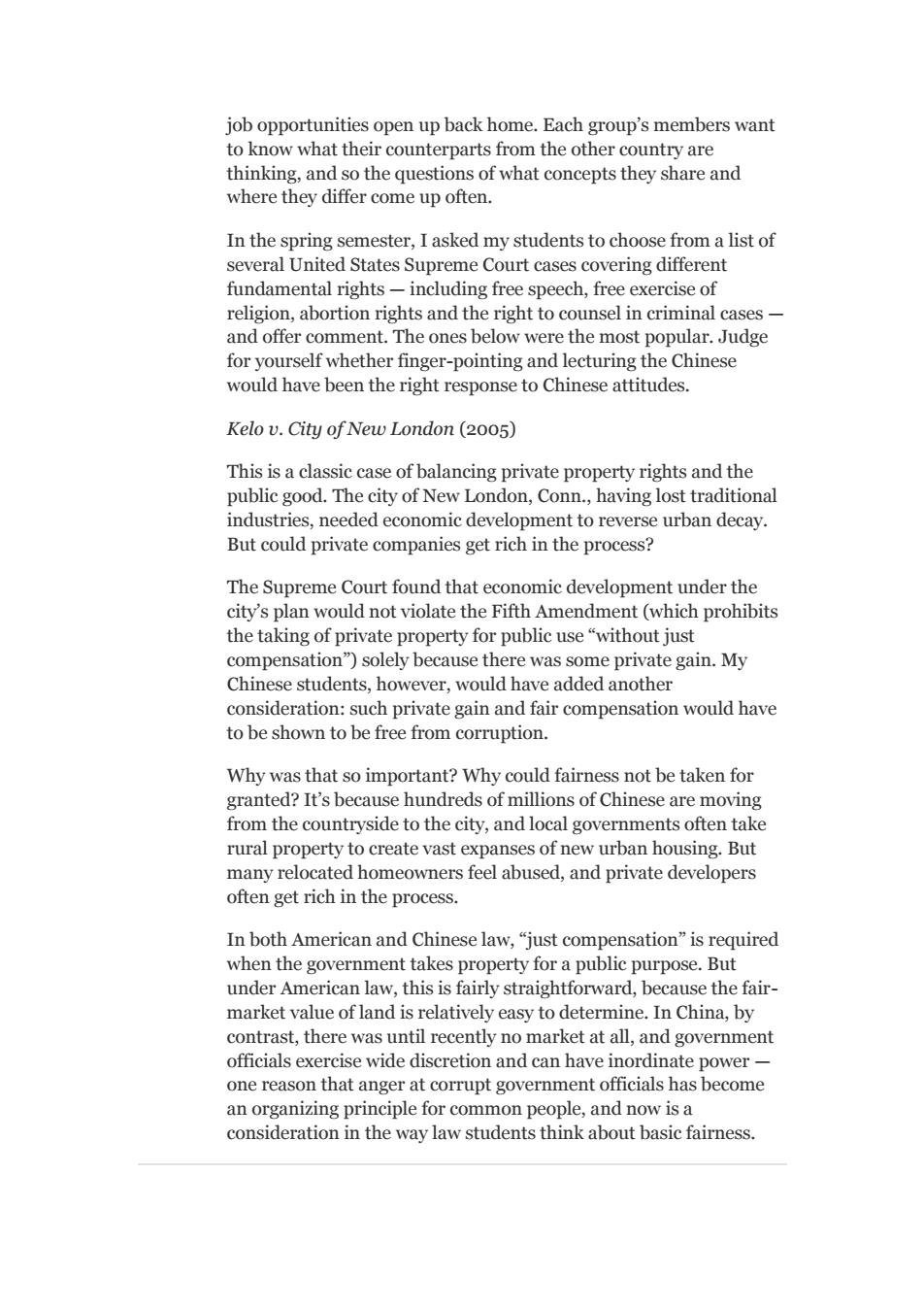正在加载图片...

job opportunities open up back home.Each group's members want to know what their counterparts from the other country are thinking,and so the questions of what concepts they share and where they differ come up often. In the spring semester,I asked my students to choose from a list of several United States Supreme Court cases covering different fundamental rights-including free speech,free exercise of religion,abortion rights and the right to counsel in criminal cases- and offer comment.The ones below were the most popular.Judge for yourself whether finger-pointing and lecturing the Chinese would have been the right response to Chinese attitudes. Kelo v.City of New London(2005) This is a classic case of balancing private property rights and the public good.The city of New London,Conn.,having lost traditional industries,needed economic development to reverse urban decay. But could private companies get rich in the process? The Supreme Court found that economic development under the city's plan would not violate the Fifth Amendment(which prohibits the taking of private property for public use "without just compensation)solely because there was some private gain.My Chinese students,however,would have added another consideration:such private gain and fair compensation would have to be shown to be free from corruption. Why was that so important?Why could fairness not be taken for granted?It's because hundreds of millions of Chinese are moving from the countryside to the city,and local governments often take rural property to create vast expanses of new urban housing.But many relocated homeowners feel abused,and private developers often get rich in the process. In both American and Chinese law,"just compensation"is required when the government takes property for a public purpose.But under American law,this is fairly straightforward,because the fair- market value of land is relatively easy to determine.In China,by contrast,there was until recently no market at all,and government officials exercise wide discretion and can have inordinate power- one reason that anger at corrupt government officials has become an organizing principle for common people,and now is a consideration in the way law students think about basic fairness.job opportunities open up back home. Each group’s members want to know what their counterparts from the other country are thinking, and so the questions of what concepts they share and where they differ come up often. In the spring semester, I asked my students to choose from a list of several United States Supreme Court cases covering different fundamental rights — including free speech, free exercise of religion, abortion rights and the right to counsel in criminal cases — and offer comment. The ones below were the most popular. Judge for yourself whether finger-pointing and lecturing the Chinese would have been the right response to Chinese attitudes. Kelo v. City of New London (2005) This is a classic case of balancing private property rights and the public good. The city of New London, Conn., having lost traditional industries, needed economic development to reverse urban decay. But could private companies get rich in the process? The Supreme Court found that economic development under the city’s plan would not violate the Fifth Amendment (which prohibits the taking of private property for public use “without just compensation”) solely because there was some private gain. My Chinese students, however, would have added another consideration: such private gain and fair compensation would have to be shown to be free from corruption. Why was that so important? Why could fairness not be taken for granted? It’s because hundreds of millions of Chinese are moving from the countryside to the city, and local governments often take rural property to create vast expanses of new urban housing. But many relocated homeowners feel abused, and private developers often get rich in the process. In both American and Chinese law, “just compensation” is required when the government takes property for a public purpose. But under American law, this is fairly straightforward, because the fairmarket value of land is relatively easy to determine. In China, by contrast, there was until recently no market at all, and government officials exercise wide discretion and can have inordinate power — one reason that anger at corrupt government officials has become an organizing principle for common people, and now is a consideration in the way law students think about basic fairness